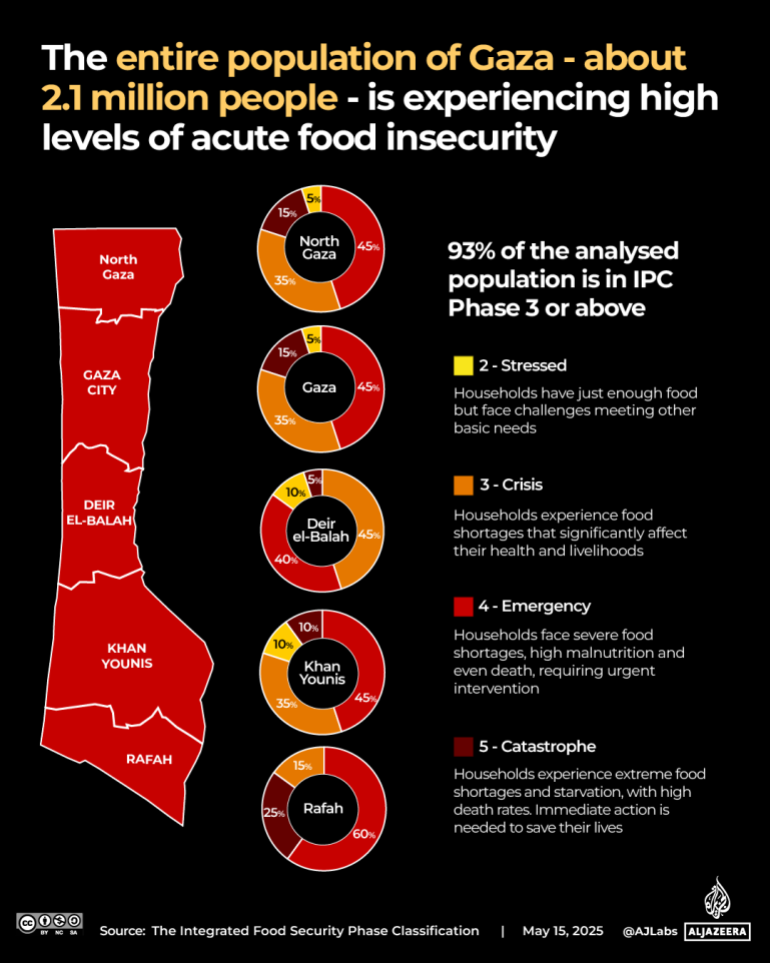Desperate crowds scramble for Gaza’s first freshly baked bread in weeks
Desperately hungry Palestinians scrambled to try and get their share of Gaza’s first freshly baked bread in weeks.
Source link
Desperately hungry Palestinians scrambled to try and get their share of Gaza’s first freshly baked bread in weeks.
Source link
Cokanasiga will start on the wing against French Top 14 side Lyon on Friday night (20:00 BST) as Premiership leaders Bath look to clinch their second trophy of the season in the European Challenge Cup final, having also been part of the squad that won the Premiership Rugby Cup in February.
He scored a scintillating try last weekend as they thrashed Leicester 43-15 in the league, running from deep in his own half after Max Ojomoh’s interception.
Bath head of rugby Johann van Graan said Cokanasiga has become a “more rounded player” during his tenure at the club.
“He’s by far the biggest winger that I’ve coached but Joe’s got this amazing ability to finish tries, he’s got this hunger to get better,” he said.
“We’ve ID’d certain bits of his game he needs to get better and he’s become a much more all-round player.”
Cokanasiga agreed his consistency across the pitch has come with the more experienced he has become.
“As I’ve gotten older my priorities have changed of how I need to perform in the game,” he said.
“Then we’ve got people like [Bath attack coach] Lee Blackett that has a different view of the game than I do and that’s helped me improve massively.
“Johann’s someone I can go and speak to about anything and let everything out, he can be honest with me, I can be honest with him, same with Lee and JP [Ferreira, defence coach].
“They give you a lot of confidence and that’s massive in players.”
Keiran Culkin is joining “The Hunger Games: Sunrise on the Reaping” as eccentric host Caesar Flickerman.
An adaptation of Suzanne Collins’ novel of the same name from her hit franchise, “Sunrise on the Reaping” hits theaters Nov. 20, 2026. It is the second prequel to the original “Hunger Games” series, following “The Ballad of Songbirds & Snakes.”
“Kieran’s scene-stealing presence and undeniable charm are perfect for Caesar Flickerman, the sickeningly watchable host of Panem’s darkest spectacle,” Lionsgate Motion Picture Group co-president Erin Westerman said in a press release. “Stanley Tucci made Caesar unforgettable — and now Kieran will make the role entirely his own.”
Culkin is on a hot streak, most recently winning the Oscar for supporting actor for the dramedy “A Real Pain” and an Emmy for his role as Roman Roy in HBO’s drama “Succession.” He is currently starring in the revival of “Glengarry Glen Ross” on Broadway.
“Sunrise” takes place 24 years before the events of the first novel featuring Katniss Everdeen (played by Jennifer Lawrence in the film franchise) and Peeta Mellark (Josh Hutcherson), and 40 years after “The Ballad of Songbirds & Snakes.” It focuses on Haymitch Abernathy’s plight during the 50th Hunger Games, known as the Second Quarter Quell, when he became District 12’s second victor. Abernathy, played by Woody Harrelson, is mentor to Katniss and Peeta in the original series.
In the prequel, Joseph Zada will play Abernathy. Other previously announced cast members include Mckenna Grace as Maysilee Donner, Jesse Plemons as Plutarch Heavensbee, Kelvin Harrison Jr. as Beetee, Whitney Peak as Lenore Dove Baird, Maya Hawke as Wiress, Lili Taylor as Mags, Ben Wang as Wyatt, Elle Fanning as Effie Trinket, Molly McCann as Louella, Iona Bell as Louella’s Capitol-assigned look-alike Lou Lou and Ralph Fiennes as the main antagonist, President Snow.
Fans of the series have been largely enthusiastic about the casting decisions, noting the strong physical likeness between the new stars and their older counterparts in the original series. On Wednesday’s Instagram post announcing Culkin’s casting, several users commented that the casting decisions were in line with fans’ visions for the new film.
A Palestinian student at US college UCLA has gained attention for going on a hunger strike to pressure the university to divest from Israel, as other supporters of Palestinian rights join the FastForGaza movement to call attention to Israel’s restrictions on food.
Published On 22 May 202522 May 2025
The United States says a new Israeli-approved organisation – the Gaza Humanitarian Foundation (GHF) – is the key to resolving the humanitarian crisis in the Gaza Strip, but it already is receiving its fair share of criticism.
The GHF says it is going to start operations before the end of May. United Nations officials and humanitarian groups say it will not have the ability to deal with the humanitarian catastrophe unfolding in Gaza as a result of Israel’s two-month-long blockade.
Instead, the aid groups that have been working in Gaza point out that they have the capacity to bring in food and other humanitarian supplies – if only Israel would let them.
So what is the GHF, and why is the situation in Gaza so desperate? Here’s everything you need to know:
Officially independent, the GHF is an Israeli- and US-backed body that plans to distribute aid in the Gaza Strip.
One in five people in Gaza currently face starvation due to the Israeli blockade of food and aid while 93 percent are experiencing acute food shortages, according to a UN-backed assessment released last week.
Under increasing international pressure to allow in aid, Israel has sought to find a solution that it says prevents aid from falling into the hands of the Palestinian group Hamas. Humanitarian organisations say the vast majority of food and other supplies reaches Gaza’s civilian population and is not diverted to fighters.
The GHF will be overseen by Jake Wood, a US military veteran who ran Team Rubicon, an organisation that distributed humanitarian aid during natural disasters.

Through the GHF, Palestinians in Gaza would receive a “basic amount of food”.
The initial plan was announced last Wednesday with a timeline of about two weeks before it was up and running.
It’s still unclear how the GHF will be funded, but the foundation says it will set up “secure distribution sites” to feed 1.2 million people in Gaza before expanding to feed every Palestinian in the territory.
It says it will coordinate with the Israeli military while security would be provided by private military contractors.
The GHF initiative has been widely panned by aid groups and the UN.
The UN and humanitarian aid agencies say they already have the means to distribute desperately needed aid and alleviate the suffering of Palestinians in Gaza. The GHF, on the other hand, is seen by critics as a way of politicising aid and not having the experience or capacity to bring aid to more than two million people.
The GHF “restricts aid to only one part of Gaza while leaving other dire needs unmet”, UN humanitarian chief Tom Fletcher said at the Security Council last week. “It makes aid conditional on political and military aims. It makes starvation a bargaining chip. It is cynical sideshow. A deliberate distraction. A fig leaf for further violence and displacement.”
The UN and aid groups say the GHF plan violates basic humanitarian principles.
“We are concerned by the proposed aid mechanism for Gaza and are deeply worried that it will not allow for humanitarian aid to be distributed in a manner consistent with core humanitarian principles of impartiality, humanity, and independence,” a statement from the International Committee of the Red Cross (ICRC) said. “The ICRC cannot work under any mechanism that doesn’t allow us to uphold the principles and our modalities of work.”
Eleven humanitarian and human rights organisations signed a statement in which they “unequivocally reject the establishment” of the GHF, calling it:
“A project led by politically connected Western security and military figures, coordinated in tandem with the Israeli government, and launched while the people of Gaza remain under total siege. It lacks any Palestinian involvement in its design or implementation.”
That lack of Palestinian involvement, coupled with Israel’s approval for the project and the planned presence of the Israeli military “on the perimeter” of the distribution sites, according to US Ambassador to Israel Mike Huckabee, raises Palestinian suspicions that the establishment of the GHF will give even more power to Israel over aid distribution in Gaza.
Israel is blocking it.
Israel began preventing the entry of all food and other humanitarian supplies into Gaza on March 2 during a ceasefire, which it unilaterally broke on March 18.
Even before the blockade, Israel restricted the amount of aid that could come in, and some Israeli protesters also blocked and destroyed aid.
The situation has reached dire levels with the World Food Programme saying 70,000 children need urgent treatment for “acute malnutrition”.
The UN said the GHF would weaponise aid by threatening the mass displacement of Palestinians.
Initial aid distribution sites would operate only out of southern and central Gaza, which the UN warned could lead to the displacement of Palestinians in northern Gaza as they are forced to move south for food and other aid.
“Humanitarian aid should not be politicized nor militarized,” the ICRC statement said. “This erodes the neutrality required to ensure assistance is delivered based solely on need, not political or military agendas.”
The initiative has also been labelled by many in the humanitarian sector as insufficient.
“Even if implemented, the plan’s proposed aid volumes fall short of the immense scale of needs in Gaza,” according to the ICRC. “The level of need right now is overwhelming, and aid needs to be allowed to enter immediately and without impediment.”
Gaza currently has 400 distribution points, and the ability and know-how to distribute aid effectively exists. With only a few distribution points under the GHF, people may be forced to walk long distances and carry heavy rations.
“The Problem is Not Logistics,” the statement from the 11 humanitarian groups read. “It Is Intentional Starvation.”
Enough. We demand rapid, safe, and unimpeded access to starving civilians in Gaza.
We have a plan. We have thousands of trucks of food at the border. Let us in. Let us work.https://t.co/J55f8shIEU pic.twitter.com/bTmcAMbG0e
— Tom Fletcher (@UNReliefChief) May 16, 2025
People with disabilities or who are injured would struggle to navigate the terrain and reach distribution points. The roads in Gaza have been badly damaged over the past 19 months of war, and the intensity of Israel’s latest military operation in Gaza is only making things more difficult for Palestinians there.
Furthermore, the GHF’s assertions that it is independent and transparent have been criticised by aid groups.
“Despite branding itself as ‘independent’ and ‘transparent,’ the Gaza Humanitarian Foundation would be wholly dependent on Israeli coordination and operates via Israeli-controlled entry points, primarily the Port of Ashdod and the Kerem Shalom/Karem Abu Salem crossing,” the statement by the 11 aid groups read.
While Hanan Salah, Human Rights Watch’s associate director for the Middle East and North Africa, didn’t comment specifically on the GHF, she said allowing “a basic amount of food” into the Gaza Strip was “complicity in using starvation as a method of warfare”.
Nearly 300 million people faced acute hunger in 2024.
The world is dangerously off course, comes the stark warning from the United Nations after it found that more than 295 million people faced acute hunger in 2024.
Fears are growing for the future as major donor countries are set to reduce funding this year.
Climate change and economic crises are affecting 96 million people in 18 countries, including Syria and Yemen.
Conflict and violence are the leading causes of the world’s largest humanitarian crisis in Sudan, after two years of civil war.
In Gaza, Israel’s blockade of all food, water and medicine has entered a third month, creating a manufactured crisis.
So is global food hunger a failure of systems – or a failure of humanity?
Presenter:
Guests:
Chris Gunness – Former director of communications at the United Nations Relief and Works Agency for Palestine Refugees in the Near East (UNRWA)
Elise Nalbandian – Regional advocacy and campaign manager for Oxfam in Africa
Sara Hayat – Specialist in climate change law and policy
Half a million people in the Gaza Strip, or one in five Palestinians, are facing starvation.
The entire rest of the population is suffering from high levels of acute food insecurity, according to a recent report by the UN’s Integrated Food Security Phase Classification (IPC).
“The risk of famine in the Gaza Strip is not just possible – it is increasingly likely,” the IPC says.
For more than 73 days, Israel has blocked all food, water, and medicine from entering Gaza, creating a man-made crisis, with the IPC warning that famine could be declared any time between now and September.

Famine is the worst level of hunger, where people face severe food shortages, widespread malnutrition, and high levels of death due to starvation.
According to the UN’s criteria, famine is declared when:
Famine is not just about hunger; it is the worst humanitarian emergency, indicating a complete collapse of access to food, water and the systems necessary for survival.
According to the World Health Organization (WHO), since Israel’s complete blockade began on March 2, at least 57 children have died from the effects of malnutrition.
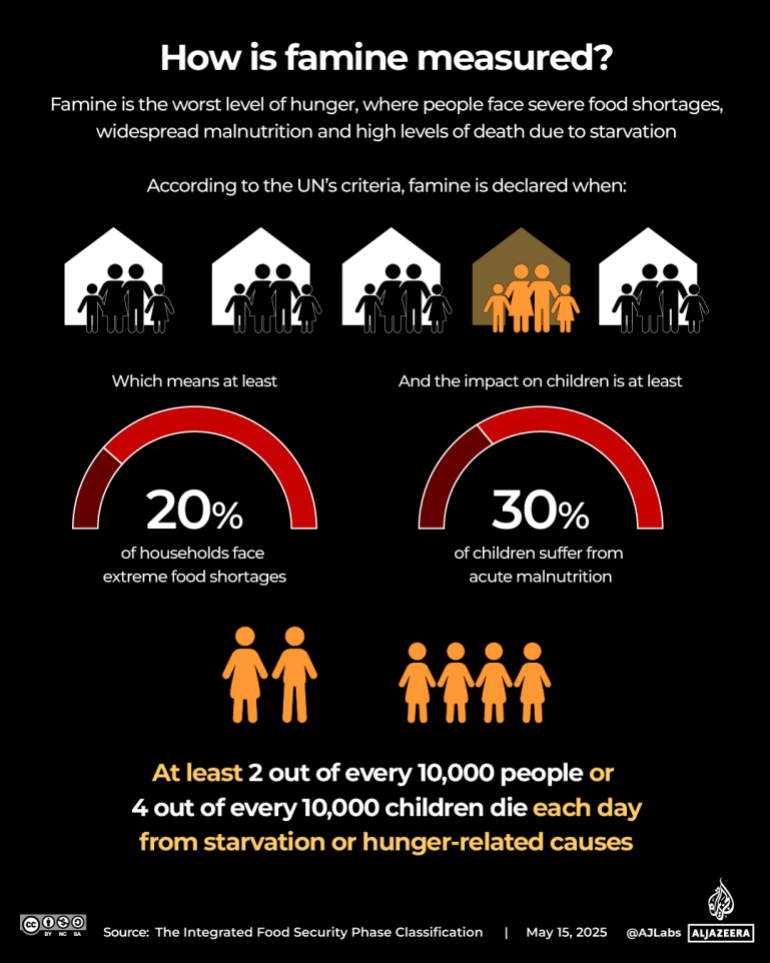
Israel is using starvation as a weapon of war. A report released by Doctors of the World (Medecins du Monde) this week states that in just 18 months, acute malnutrition in Gaza has risen to levels similar to those found in countries enduring protracted humanitarian crises spanning several decades.
Starvation is when the human body is deprived of food for so long that it suffers and often dies.
Estimates say the body can last up to three weeks without food, but the length of time varies between individuals.
Starvation occurs over three stages. The first begins as early as when a meal is skipped, the second occurs with a prolonged period of fasting where the body uses stored fat for energy.
The third, and often fatal, stage is when all stored fats have been depleted and the body turns to bone and muscle as sources of energy.
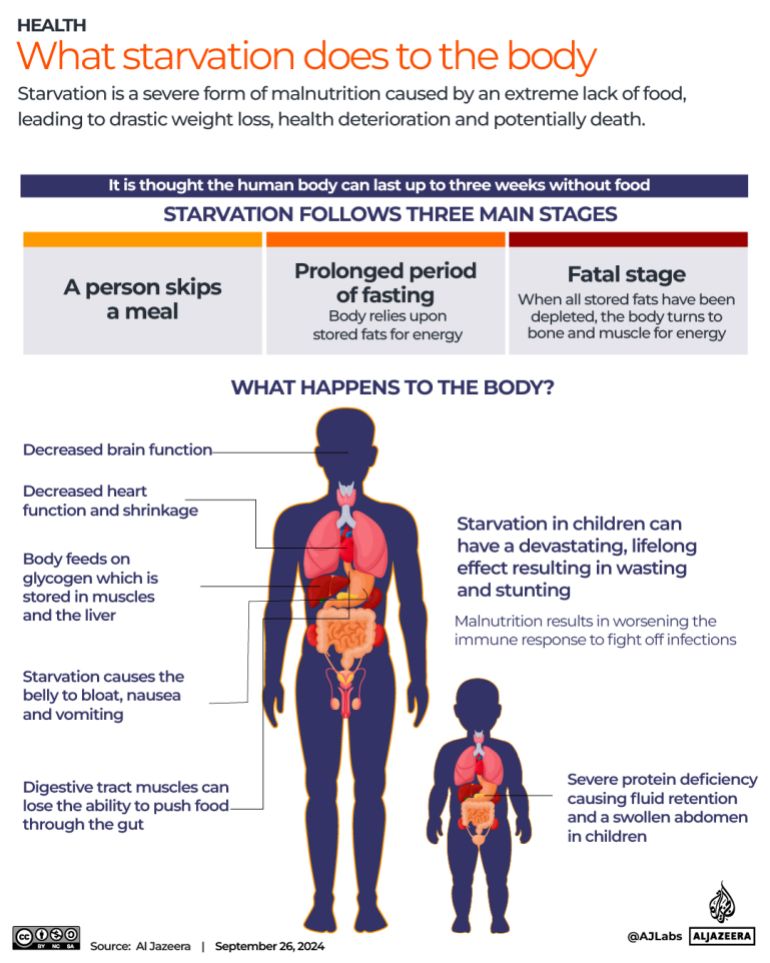
Children are most vulnerable to Israel’s continued blockade of essential food items.
More than 9,000 children have been admitted to hospital for treatment for acute malnutrition since the start of the year, according to the United Nations.
The IPC projects that between now and March 2026, nearly 71,000 children under the age of five will suffer from acute malnutrition, including 14,100 children facing severe cases of malnutrition.
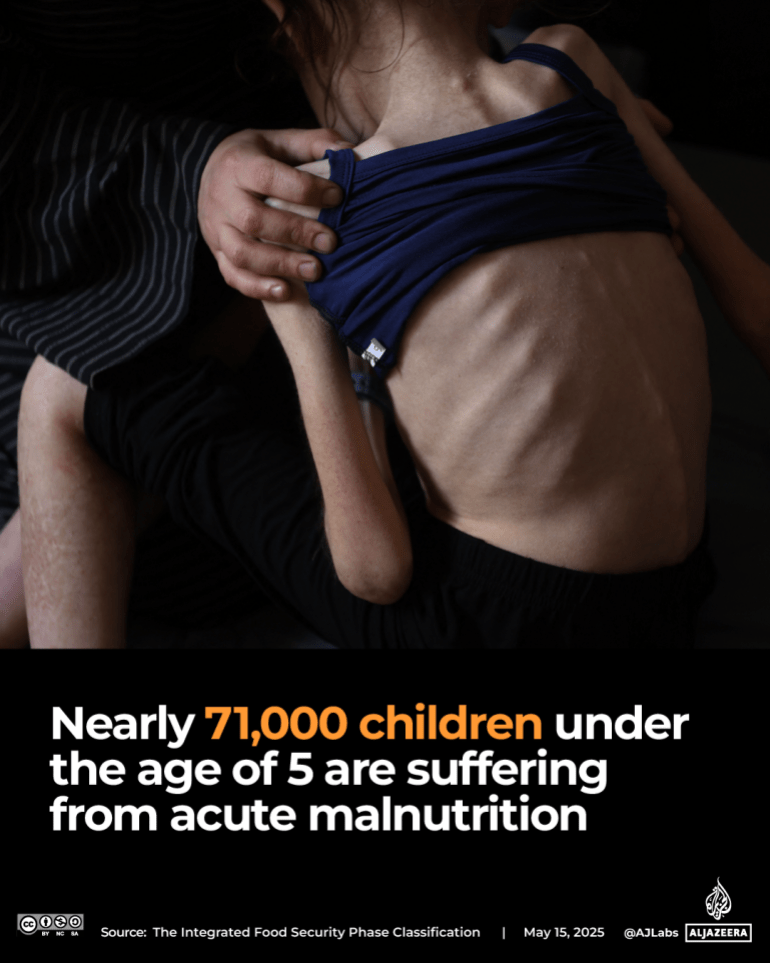
The effect of malnutrition on children varies, but the first 1,000 days of a child’s life, which includes the pregnancy up to two years, are critical for a child’s healthy development.
Malnutrition leads to an out-of-proportion height-to-weight ratio, stunted growth and eventually, death.
Earlier this month, at Kamal Adwan Hospital in Beit Lahiya, in northern Gaza, Dr Ahmed Abu Nasir said the situation has become worse than ever due to the blockade.
“Children are in their growing stage and badly need certain nutrients, including proteins and fats,” the paediatrician told Al Jazeera. “These are not available in the Gaza Strip, particularly in the north.”
Pregnant and breastfeeding women will also need to be treated for malnutrition, with 17,000 women facing this risk.
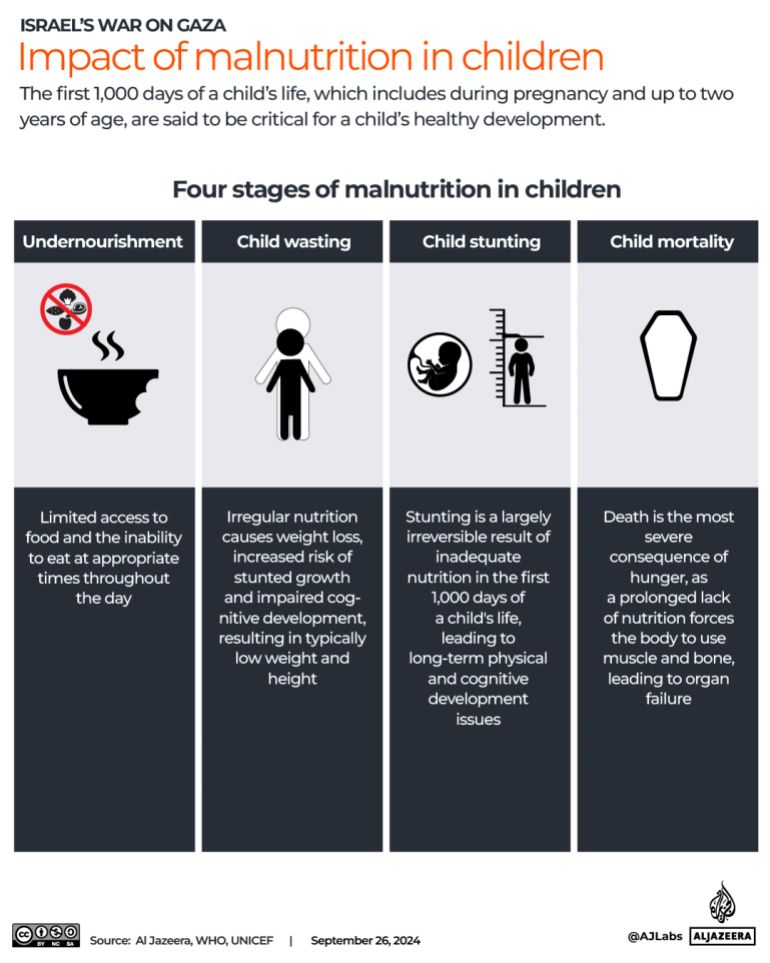
The entire population of Gaza, about 2.1 million people that remain, are facing levels of food shortages that threaten their existence.
Earlier this month, Ahmad al-Najjar, a displaced Palestinian in Gaza City, told Al Jazeera, “Finding a single meal has become an impossible quest.”
Despite large numbers of trucks carrying vital supplies piling up on the border between Egypt and the Gaza Strip, Palestinians in Gaza have resorted to selling rubbish to afford the eye-wateringly inflated food prices.
Some 93 percent of Gaza’s population is at risk of levels of food insecurity above the crisis levels indicated by the IPC. If the situation does not change, the IPC has indicated that of those 2.1 million people:
In essence, in as little as a month, Gaza’s entire population could be starving.
The features of malnutrition and starvation are unmistakable in Gaza, with severely underweight children and babies. In children, severe protein deficiency causes fluid retention and a swollen abdomen.
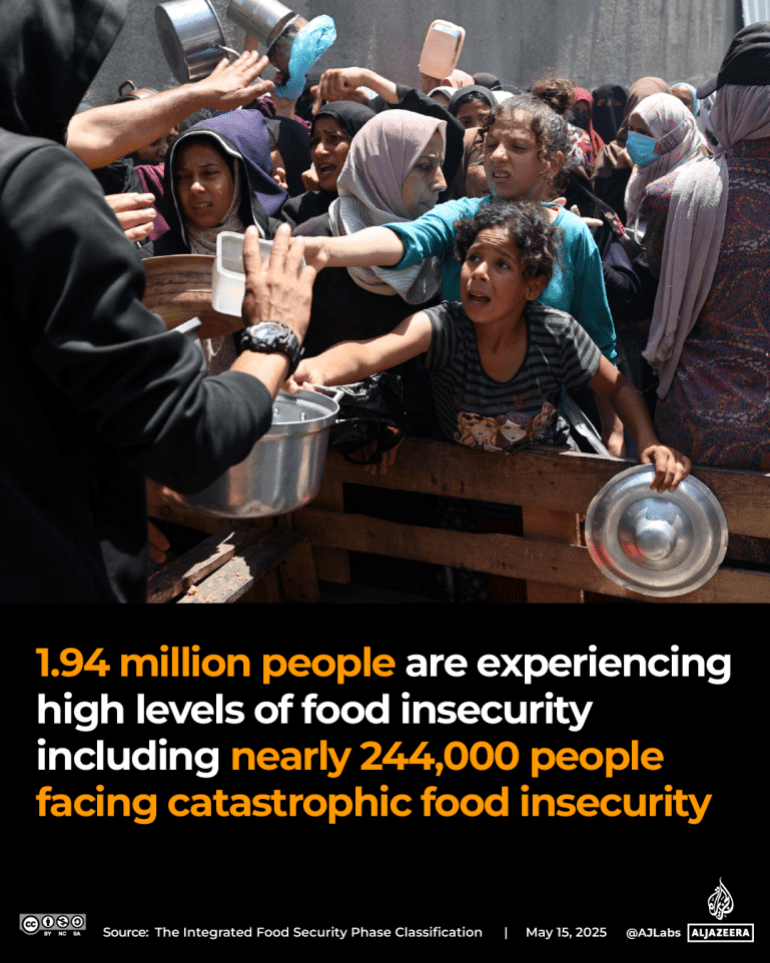
Food insecurity across the Gaza Strip is severely affecting all areas of the blockaded enclave.
All 25 bakeries supported by the World Food Programme (WFP) closed at the beginning of April due to the lack of supplies, and food stocks for most of the 177 hot meal kitchens are reportedly exhausted.
Certain governorates are experiencing more severe levels of hunger. According to the IPC:
The IPC says Israel’s continued blockade “would likely result in further mass displacement within and across governorates”, as items essential for people’s survival will be depleted.
